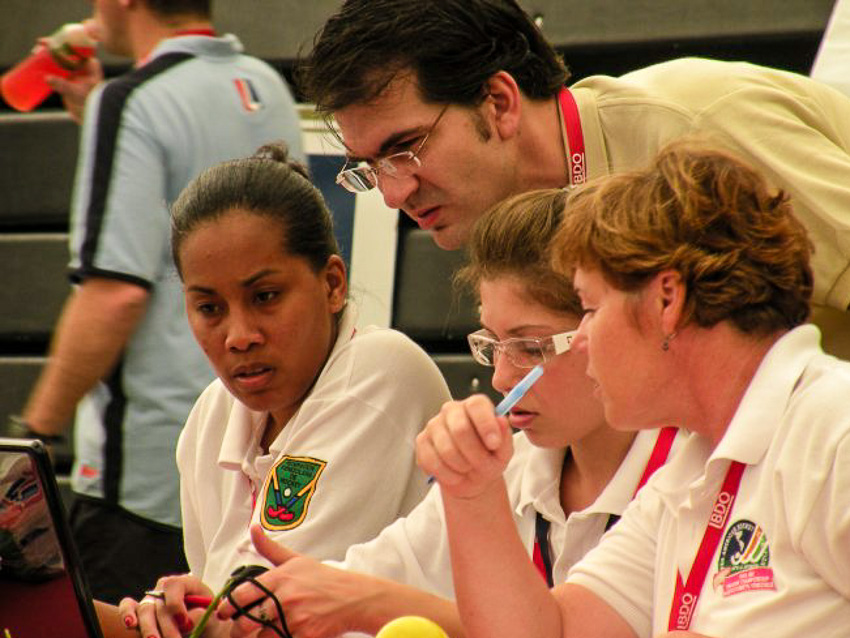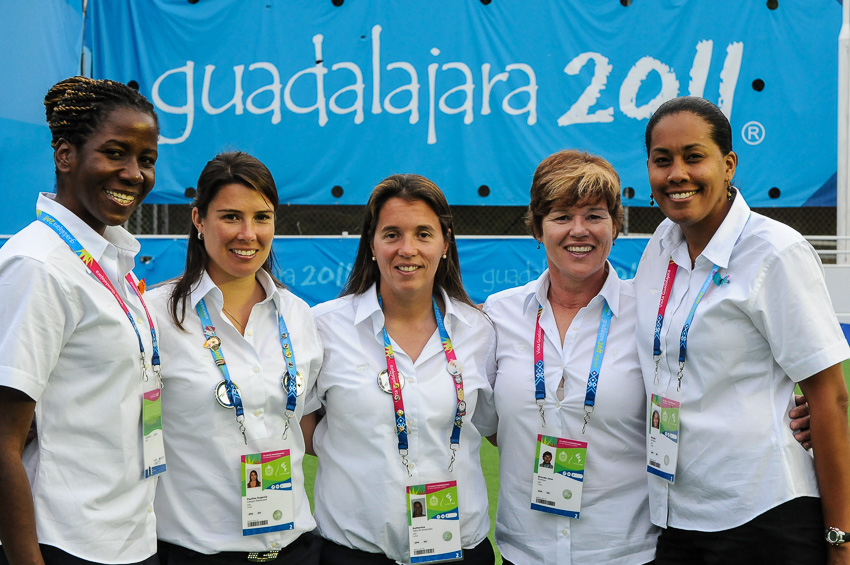
Nataki Akii-Bua is going to be a busy woman over the next few months. At the Women's Pan Am Junior Championship in her home nation of Trinidad and Tobago, she will be one of two Technical Officers working as part of the PAHF team of officials, while also working on one of the sub-committees of the local organising committee (LOC) in the area of sport operations. Just two months later and Nataki will be jetting over to Canada for a completely different role as a manager to one of the men's teams competing in the Men's Pan Am Junior Championship.
It takes a special person to give their time so selflessly, but just a few minutes in Nataki's company and you realise that this is a person with a deep love of the game and a desire to make sure that each event is run to the same high standards, and to the enjoyment of everyone involved. She is a unique mix of relaxed attitude and razor-sharp attention to detail.
Talking about her role in Toronto, Nataki says: "This role, although not new to me, having managed the Junior Men in 2012 in Guadalajara, Mexico, always brings different challenges but assisting our junior players develop on and off the field of play is one of my driving forces."
Nataki's involvement in international hockey started back in 2007, when she was a judge at a Caribbean Tournament, but she had been involved in local tournaments in a range of different roles leading up to that moment, from administrative assistant, judge, technical officer and tournament director. Now she tends to be appointed to major international events as either a judge or a technical official. Her most recent high profile position was as a judge at the 2015 Hockey World League Finals in Rosario, Argentina. She is currently a category five technical official within the FIH tournament structure, which means she has been identified as a “promising international technical officer for FIH and Continental Federation events."
As a judge, or technical officer, Nataki says the skills needed are very close to the qualities needed in the business world, namely: strong organisational and interpersonal skills, problem solving techniques, willingness to keep learning and a service oriented nature. The technical officials are the right-hand women to the tournament director and will be on hand to deal with any issues concerning the safe and effective running of the tournament. It is a role that Nataki enjoys, largely because it means she feels involved with all aspects of the tournament. "As a technical official, one interacts with all stakeholders; the grounds staff, security, players, staff, spectators, media, vendors, the LOC and other volunteers. You have a greater appreciation for all the persons involved who contribute to our beloved sport.
At the forthcoming event in Tacarigua, Nataki will be one of the more senior officials and, as such, she will be on hand to help the “newer” members of the team. As she explains, it is not just the nations playing on the pitch who need to get the dynamics right, it is important that the group of officials organising the event also work together as a team. The Junior Pan Am Championship is a stage for future hockey stars, but it is also where young officials will be cutting their teeth and Nataki, as an experienced official, will be working hard to make sure everyone plays their role effectively.
She says that the most important thing is for all the tournament officials to realise that they must take a service oriented approach while sticking to the policies and procedures that are in place to ensure the tournament runs smoothly. This can involve smoothing ruffled feathers of a team manager or coach or explaining to players why something has to happen a certain way, but the most important thing is that everyone follows the policies that underpin the event management. "Once that is all in place," says Nataki, "The tournament will be managed well and will be successful."
For the technical officials specifically, Nataki says, the main role is to assist the teams and the players to achieve their targets while maintaining their values. "As technical officials, our roles can be multifaceted in terms of assisting in the management of the games prior to, during and even at the end of the respective tournament."
Looking back over her time as an official at international events, one tournament still stands out in Nataki's mind. She was judge at the Junior Pan Am Women's Championships, Mexico City, Mexico in 2008 and says of that event: "The officials had a great team dynamic, some of those umpires who blew the whistle there are now World Panel Umpires and the Tournament Director, Paula Parks, was the catalyst in terms of the team synergy and tournament management. That was a really great event and a good learning experience for me."
From an early age, Nataki was encouraged to put herself forwards to help out. She says, "my parents always taught their children to give back and assist others." But her devotion to duty extends further than that. Nataki loves the different experiences that every tournament brings to the table. As she says, "each event has different issues or challenges and presents learning opportunities to assist in the continued development of local hockey."
For the women's event, Nataki is excited at the opportunity to showcase hockey in her own home nation. Hockey still remains a relatively poor cousin in terms of recognition in the Caribbean, but events such as the Junior Pan Am Championships are raising the profile and stirring enthusiasm among the Trinidad and Tobago population.
For the men, who have improved with every edition of the tournament, a medal position would send them off to the Junior World Cup and that is something that really would get the Trinidad and Tobago people talking about hockey.
And Nataki's busy year will continue in Salamanca, Mexico, in September, when she will be reunited with Paula Parks, working as Technical Official at the Hockey World League Round One.




